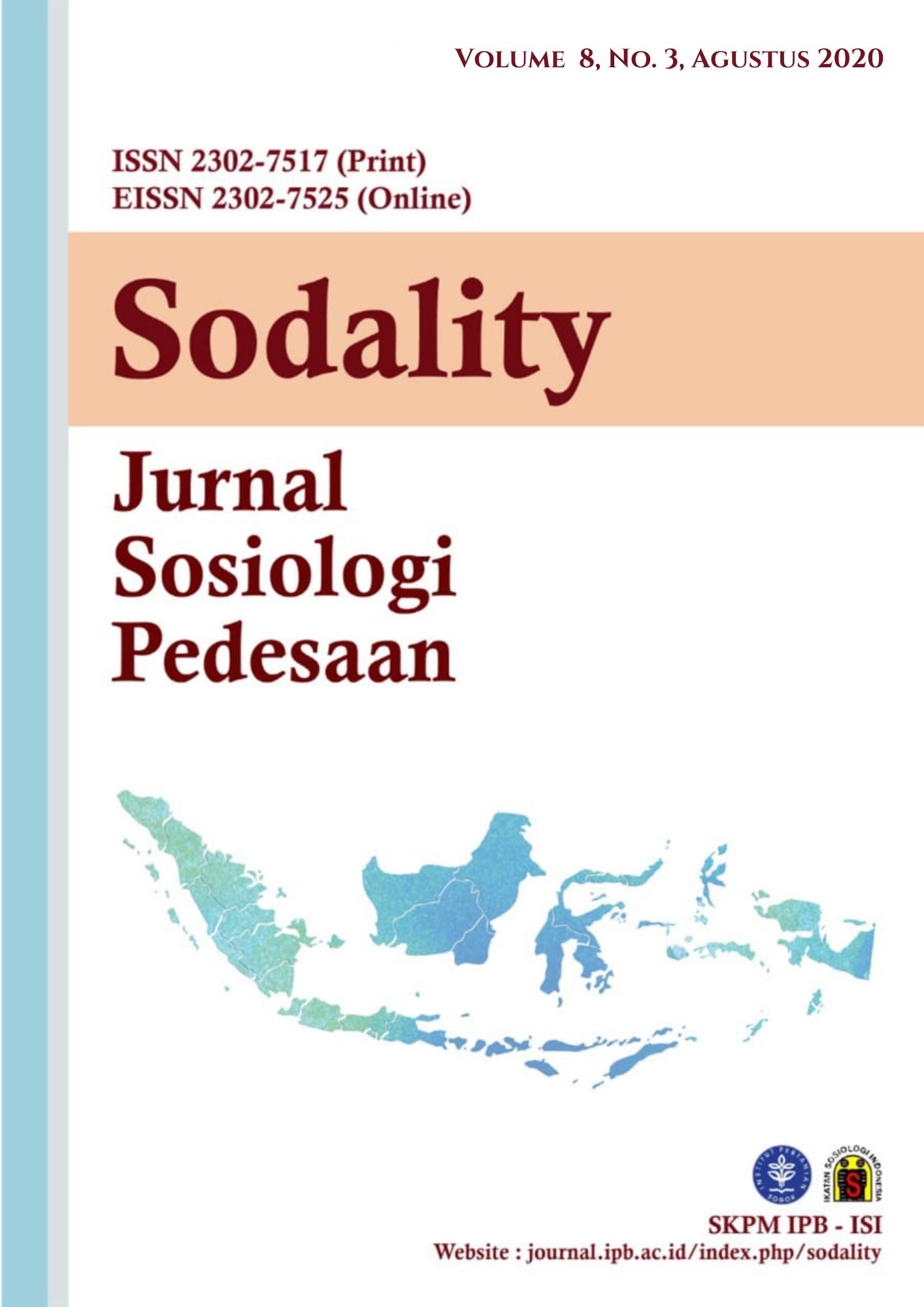Expansion and Conflict at Oil Palm Plantations: A Case in Terantang Manuk Village, Pelalawan District, Riau
Abstract
The massive expansion of oil palm plantations has social, economic and environmental impacts. One of the social impacts caused by the expansion of palm oil plantations is social conflict, so the purpose of this research is to identify and analyze the relationship between expansion and conflict in oil palm plantations in Terantang Manuk Village, Pelalawan-Riau. Palm oil plantation expansion is one of the factors for the emergence of social conflicts in rural areas. This research was conducted using a qualitative approach. Primary data were collected through in-depth interviews with the determination of the informants using purposive sampling technique. There were 16 informants who were interviewed, consisting of the village head, hamlet head, customary chairperson (ninik mamak), community leaders, chairperson of Cooperative Terantang Jaya Mandiri (TJM), leader of youth organization, and leader of college student organization. Secondary data quoted from archives of public correspondence, court decisions, and information from the mass media. The results of this study indicate that there are two types of expansion, namely informal expansion and formal expansion. Informal expansion only causes land conflicts, while formal expansion causes more diverse conflicts, namely land conflicts and conflicts due to oil palm plantation activities.
References
Abram, N. K., Meijaard, E., Wilson, K. A., Davis, J. T., Wells, J. A., Ancrenaz, M., Budiharta, S., Durrant, A., Fakhruzzi, A., Runting, R. K., Gaveau, D., & Mengersen, K. (2017). Oil palm–community conflict mapping in Indonesia: A case for better community liaison in planning for development initiatives. Applied Geography, 78, 33–44. https://doi.org/10.1016/j.apgeog.2016.10.005
Amalia, R., Dharmawan, A. H., Prasetyo, L. B., & Pacheco, P. (2019). Perubahan Tutupan Lahan Akibat Ekspansi Perkebunan Kelapa Sawit: Dampak Sosial, Ekonomi dan Ekologi. Jurnal Ilmu Lingkungan, 17(1), 130. https://doi.org/10.14710/jil.17.1.130-139
Badan Pusat Statistik. (2018). Pangkalan Kuras Dalam Angka 2018.
Badan Pusat Statistik. (2019). Statistik Kelapa Sawit Indonesia 2018 (Issue 1). https://doi.org/10.16309/j.cnki.issn.1007-1776.2003.03.004
Barreiro, V., Iqbal, M., Limberg, G., Prasodjo, R., Sileuw, A., & Schweithelm, J. (2016). the Cost of conflict in oil palm in Indonesia.
Colhester, M. (2011). Palm Oil and Indigenous Peoples in South East Asia.
Direktorat Jenderal Perkebunan. (2020). Statistik Perkebunan Indonesia 2018-2020.
Effendy, M. (2011). Dampak sosial ekonomi dan budaya perkebunan kelapa sawit : studi kasus PIR V Ngabang PT Perkebunan Nusantara KIII di Kalimantan Barat.
Fahrimal, S., & Safpuriyadi, Y. (2018). Komunikasi Strategik Dalam Penyelesaian Konflik Agraria Di Indonesia. Jurnal Riset Komunikasi, 1(1), 109–127.
Gatto, M., Wollni, M., Asnawi, R., & Qaim, M. (2017). Oil Palm Boom, Contract Farming, and Rural Economic Development: Village-Level Evidence from Indonesia. World Development, 95(July), 127–140.
Hidayah, N., Dharmawan, A. H., & Barus, B. (2016). The Expansion Of Palm Oil Plantation And Changes Of Rural Social Ecology. Sodality: Jurnal Sosiologi Pedesaan, 4(3). https://doi.org/10.22500/sodality.v4i3.14434
Ishak, A., Kinseng, R. A., Sunito, S., & Damanhuri, D. S. (2017). Ekspansi Perkebunan Kelapa Sawit Dan Perlunya Perbaikan Kebijakan Penataan Ruang/ Palm Oil Expansion And Requirement Spatial Planning Policy Improvement. Perspektif, 16(1), 14–23. https://doi.org/10.21082/psp.v16n1.2016
Konsorsium Pembaruan Agraria. (2018). Masa Depan Reforma Agraria Melampaui Tahun Politik.
Mantiri, M. M. (2013). Analisis Konflik Agraria Di Pedesaan (Suatu Studi Di Desa Lemoh Barat Kecamatan Tombariri). Governance, 5(1).
Miles, B. M., & Huberman, M. (1992). Analisis Data Kualitatif Buku Sumber Tentang Metode-metode BaruNo Title. UIP.
Mutolib, A., Mahdi, Yonariza, & Ismono, H. (2015). Konflik Agraria Dan Pelepasan Tanah Ulayat (Studi Kasus Pada Masyarakat Suku Melayu Di Kesatuan Pemangkuan Hutan Dharmasraya, Sumatera Barat). Jurnal Penelitian Sosial Dan Ekonomi Kehutanan, 12(3), 213–225.
Nugraha, D. S., & Suteki. (2018). Politik Hukum Penanganan Konflik Perkebunan Oleh Pemerintah Yang Berkeadilan Sosial. Kanun Jurnal Ilmu Hukum, 20(1), 103–122.
Obidzinski, K., Takahashi, I., Dermawan, A., Komarudin, H., & Andrianto, A. (2013). Can large scale land acquisition for agro-development in Indonesia be managed sustainably? Land Use Policy, 30, 952–965. https://doi.org/10.1016/j.landusepol.2012.06.018
Prabowo, D., Maryudi, A., Senawi, & Imron, M. A. (2017). Conversion of forests into oil palm plantations in West Kalimantan, Indonesia: Insights from actors’ power and its dynamics. Forest Policy and Economics, 78, 32–39.
Ruslan, I. (2014). Perubahan Sosial dan Ekonomi Masyarakat Akibat Perkebunan Kelapa Sawit. Al-Maslahah, 9(2), 32–51.
Sayer, J., Ghazoul, J., Nelson, P., & Klintuni Boedhihartono, A. (2012). Oil palm expansion transforms tropical landscapes and livelihoods. Global Food Security, 1(2), 114–119. https://doi.org/10.1016/j.gfs.2012.10.003
Sumardjo, Dahri, Riyanto, S., Saleh, A., & Firmansyah, A. (2014). Tipologi Konflik Berbasis Sumber Daya Pangan Di Wilayah Perkebunan Sawit. Jurnal Ilmu Pertanian Indonesia, 19(3), 189–196.
Thomas, Sikwan, A., & Rahmaniah, E. (2015). Konflik Sosial Antara Perusahaan Perkebunan Sawit Pt. Borneo Ketapang Permai Dengan Masyarakat Desa Semayang Kecamatan Kembayan, Kabupaten Sanggau. Jurnal Tesis PMIS-UNTAN.
Utami, R., Kumala Putri, E. I., & Ekayani, M. (2017). Economy and Environmental Impact of Oil Palm Palm Plantation Expansion (Case Study: Panyabungan Village, Merlung Sub-District, West Tanjung Jabung Barat District, Jambi). Jurnal Ilmu Pertanian Indonesia, 22(2), 115–126. https://doi.org/10.18343/jipi.22.2.115
Widiono, S. (2008). Studi Kasus Terbentuknya Perkebunan Kelapa Sawit Rakyat pada Dua Desa Sawah Etnis Serawai dan Jawa di Kabupaten Seluma, Propinsi Bengkulu. Jurnal Agrisep Universitas Bengkulu, 7(1), 54–71.
Authors who publish with this journal agree to the following terms:
- Authors retain copyright and grant the journal right of first publication with the work simultaneously licensed under a

This work is licensed under a Creative Commons Attribution 4.0 International License. that allows others to share the work with an acknowledgement of the work's authorship and initial publication in this journal. - Authors are able to enter into separate, additional contractual arrangements for the non-exclusive distribution of the journal's published version of the work (e.g., post it to an institutional repository or publish it in a book), with an acknowledgement of its initial publication in this journal.
- Authors are permitted and encouraged to post their work online (e.g., in institutional repositories or on their website) prior to and during the submission process, as it can lead to productive exchanges, as well as earlier and greater citation of published work (See The Effect of Open Access).





.png)









